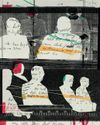
Recently, some of the world's biggest pop stars have been eschewing bangers in favor of a more postmodern, self-referential approach to the form. I don't necessarily mind the idea of personal mythology being central to unpacking an album's themes (it keeps me employed, after all), but the immediacy and the broad appeal of pop music have always felt crucial to its pleasure. The twenty-eight-year-old singer Dua Lipa, who was born in London to Kosovo Albanian parents, appears to instinctively understand the utility of pop as escapist fantasy. Lipa's new album, "Radical Optimism," does not require its listeners to know anything about Lipa, or Recently, some of the her constellation of associates, or her cultural history, or her relationship to the past; it doesn't require knowing anything about anything, really, except how cleansing and ecstatic it can feel to move your body with brainless abandon.
Lipa is not alone on this journey-Sabrina Carpenter, Tate McRae, and Troye Sivan are all working in similar modes but she might be our most reliable performer of astute, frictionless pop. (Lipa, of course, owes a debt to her predecessors, including Kylie Minogue, Madonna, and Britney Spears.) She seems fully committed to pop as a genre with boundaries (short songs, big hooks, broadly adaptable lyrics). That could be why she was tasked with opening the Grammys telecast this year, performing a medley of tracks from "Radical Optimism." This is not hard music to enjoy the first time you hear it.
This story is from the May 13, 2024 edition of The New Yorker.
Start your 7-day Magzter GOLD free trial to access thousands of curated premium stories, and 9,000+ magazines and newspapers.
Already a subscriber ? Sign In
This story is from the May 13, 2024 edition of The New Yorker.
Start your 7-day Magzter GOLD free trial to access thousands of curated premium stories, and 9,000+ magazines and newspapers.
Already a subscriber? Sign In

GET IT TOGETHER
In the beginning was the mob, and the mob was bad. In Gibbon’s 1776 “Decline and Fall of the Roman Empire,” the Roman mob makes regular appearances, usually at the instigation of a demagogue, loudly demanding to be placated with free food and entertainment (“bread and circuses”), and, though they don’t get to rule, they sometimes get to choose who will.

GAINING CONTROL
The frenemies who fought to bring contraception to this country.

REBELS WITH A CAUSE
In the new FX/Hulu series “Say Nothing,” life as an armed revolutionary during the Troubles has—at least at first—an air of glamour.

AGAINST THE CURRENT
\"Give Me Carmelita Tropicana!,\" at Soho Rep, and \"Gatz,\" at the Public.

METAMORPHOSIS
The director Marielle Heller explores the feral side of child rearing.

THE BIG SPIN
A district attorney's office investigates how its prosecutors picked death-penalty juries.

THIS ELECTION JUST PROVES WHAT I ALREADY BELIEVED
I hate to say I told you so, but here we are. Kamala Harris’s loss will go down in history as a catastrophe that could have easily been avoided if more people had thought whatever I happen to think.

HOLD YOUR TONGUE
Can the world's most populous country protect its languages?

A LONG WAY HOME
Ordinarily, I hate staying at someone's house, but when Hugh and I visited his friend Mary in Maine we had no other choice.

YULE RULES
“Christmas Eve in Miller’s Point.”